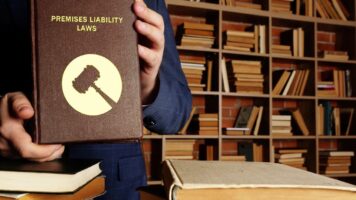Drunk driving can cause significant losses to many families. Even if someone survives the resulting accidents, they can lead to long-term physical impairment and painful injuries. When you face medical bills, impairments, and a lifetime of unexpected challenges from a drunk driving accident, getting your life back on track can seem impossible.
After a drunk driving accident, you may pursue compensation for your losses. However, you must follow a complex legal process to obtain justice. You cannot simply point fingers at a drunk driver and expect to receive compensation. Instead, you must provide evidence to sufficiently prove your liability claims and losses.
Hiring an attorney with experience in pursuing drunk driving accident compensation is critical. Many obstacles can get in the way of obtaining the compensation you deserve, including gathering challenging-to-obtain evidence. Hiring a skilled car accident attorney is the best way to collect evidence and obtain compensation after a drunk driving car accident.
How Does an Attorney Obtain Evidence in a Drunk Driving Car Accident?
Your attorney will work closely with you and evaluate your situation. They will learn as much as they can about what you remember and what occurred during and before the incident. They can use bits and pieces of lots of evidence to create a full picture of what occurred and, as a result, who you can hold responsible.
Anything you share might help them discover key evidence for your case, so leave nothing out. Also, the sooner you speak with a lawyer while your memory is fresh, the better.
Below are some examples of evidence your attorney may collect and use to seek compensation for your losses. Of course, evidence varies from case to case, so this is not a complete list.
Drug and alcohol testing
In many situations, the police will require a person to undergo a chemical test at the time of the incident to determine their blood alcohol level. A blood alcohol level is a percentage that shows just how much alcohol is in the system at a certain time. This level indicates whether the driver was in violation of the state’s drinking and driving laws and can indicate intoxication.
When available, it is one of the most important and valuable tools your attorney has to prove drunk driving caused your injuries.
A blood alcohol test must happen within a short time of the accident, as alcohol dissipates from the system within a few hours. If you suspect a driver was drunk, quietly tell the police officers at the scene of the accident. This might induce them to conduct chemical testing to determine whether they should arrest the driver. If the police do not perform an alcohol test, you cannot compel the driver to do so later.
If the driver had a blood alcohol level over the legal limit, the police will likely arrest the driver for driving while intoxicated (DWI). The test results will go into their criminal file, which your attorney can obtain.
Police reports
Another valuable piece of information is the police report from the incident. The police report should document all evidence in the case from the scene of the crash. That may include information about blood alcohol levels and any other information the police have that may indicate drunk driving. The police report may contain obvious and less obvious details that can support your belief that the driver was under the influence of alcohol.
Some insights from the report that might help your case include:
- The police officer smelled alcohol or drugs on the driver
- Evidence that the driver was not physically capable of walking or operating a car
- Documentation of slurred words and being confused
- Failed field sobriety testing
- Indications that the person was passed out in the driver’s seat
- A lack of any evidence of braking during the accident
The police report documents evidence gathered by a law enforcement professional. Insurance companies will likely take information from the police seriously. Your lawyer can request a copy of the police report and review the details early in the process.
DWI Convictions
While alcohol testing and police reports can be persuasive to an insurance company, the strongest piece of evidence you can present is a conviction of the driver for DWI. If the driver faced criminal charges and received a conviction or pled guilty, this is automatic proof of their misconduct and liability for your accident.
When someone violates a safety law and causes harm, this is negligence per se, which means “negligence in itself.” The conviction of the criminal law is enough to prove their negligence, and you do not need to provide additional evidence of liability.
Even though criminal cases are separate proceedings from civil car accident claims, a criminal conviction can play a critical role in your case. Your attorney can obtain records of any DWI conviction and use them in your claim.
Witness statements
Witnesses may see a car accident. Eyewitness statements can convince a jury of your claim. Even if you did not obtain any witness information at the scene due to your injuries, the police should include this information in their report.
Your attorney can gather any address or contact information for noted accident scene witnesses. This may include passengers in the vehicle, people passing by, or others in the area. They can interview the witnesses and use their accounts to build your case.
Camera footage
These days, cameras are everywhere. People video anything of interest on their phones, and most businesses and homes have exterior cameras. There are cameras on roadways to monitor traffic and road conditions, and often cameras at intersections to capture red-light infractions. Camera footage might show the drunk driver did not maintain control of their car and caused the accident.
Camera footage like this can prove who caused a crash, and insurance companies cannot easily question or disprove it. Your lawyer can identify any potential cameras near the accident and seek the footage when possible.
Where the motorist was before the crash
Your car accident lawyer might determine the driver drank at a local bar or establishment before the crash. What they drank and for how long can convince a jury of their intoxication.
Further, if your state imposes dram shop liability, the establishment may share liability for your claim if the establishment over-served the driver before they got into their car or the bar served an underage driver.
Not only can such evidence prove drunk driving, but it also might open up another source of liability for your losses. Your attorney can advise whether your state has dram shop laws.
Driver information and statements
In some situations, the driver themselves may provide enough information to make it clear they were intoxicated. This may come from statements they make to the police officer, but also before and after the accident.
They may state to their friend how much they drank. They may also post on social media what they did – which your attorney might access and use in your claim.
What You Need to Recover Monetary Damages
How much evidence do you need to prove a driver was intoxicated? What do you need to do to present to an insurance company for it to accept liability?
Generally, you must have sufficient evidence to prove all elements of negligence to seek compensation for your losses:
- The driver owed you a duty of care (all drivers owe others a duty to drive safely and follow the law).
- The driver breached their duty of care (drunk driving certainly qualifies as a breach of duty)
- The driver’s actions directly caused the accident.
- As the victim in the accident, you must have suffered at least one injury and losses.
Your attorney can gather evidence to meet your burden of proof in your specific situation.
Seeking Compensation After a Drunk Driving Accident
After you have evidence of liability, your car accident attorney can file an insurance claim with the drunk driver’s insurance company. Before that, they will:
Determine all of your losses from the accident
Your losses are likely to include more than just your medical bills. You may have both economic losses – like medical bills and lost income from missed time at work – along with non-economic losses like pain and suffering.
Always work closely with your car accident attorney to calculate and document all losses, including:
- Medical bills from the emergency room
- Specialist care
- Hospital stay costs
- Medication costs
- Rehabilitation costs
- Lost time at work
- Physical and emotional pain and suffering
- Permanent disabilities
- Permanent disfigurement
- Loss of enjoyment of life
These are some of the most common losses after a drunk driving accident but do not represent all potential damages you might pursue.
Negotiate with the insurance company
The car accident attorney will then negotiate with the insurance company for a settlement that fully covers the losses you experienced. This is much more complex than simply sending a document demanding a specific amount. The insurance company will need as much evidence as possible of your losses.
Medical bills, pay statements, and other financial documents can prove your economic losses. Proving non-economic losses is more challenging, as they are intangible with no inherent financial value. Your attorney can use evidence, such as expert opinions, witness statements, journals, and more, to prove these non-economic losses.
The insurance company may:
- Deny the claim for some reason
- Offer a lower amount
- Require additional information
- Question parts of the claim
This initial claim may not result in full compensation. Instead, the insurer will likely make a low offer despite strong evidence of your losses or even deny liability altogether. Your lawyer can present additional information and evidence to prove your claim and negotiate the settlement you deserve.
File an Injury Lawsuit
Many times, the evidence of drunk driving is clear, and the main issue in dispute is how much you deserve for your losses. If your attorney cannot convince the insurance company to accept a fair settlement, your lawyer will discuss your options to escalate your claim.
When there is no settlement agreement directly with the insurer, it may be time to file a personal injury lawsuit in civil court. This process will involve preparing and filing a petition stating your claim and the losses you have incurred. Evidence is a critical element of litigation, so everything your attorney gathered will be necessary during this process.
Hire a Car Accident Attorney to Get Evidence Against a Drunk Driver

Phillip J. Barkett, Car Accident Attorney
Evidence is necessary to prevail in a drunk driving accident claim. You cannot receive compensation without proving liability and your losses. Insurance companies will never take your word about what happened, as they work to avoid liability whenever possible.
So how do you get evidence in a drunk driving case? You turn to an experienced car accident attorney who can navigate the process with you and handle every step of the legal process.
When someone has acted in such a way that it changed your life through their reckless behavior, you should seek compensation for the losses you have incurred.
You need legal help to do so.
Set up a free consultation with a trusted and experienced personal injury lawyer to discuss your case today. The sooner you begin, the sooner your attorney can start preserving evidence in your case. Evidence weakens with time, so act now to protect your rights.


